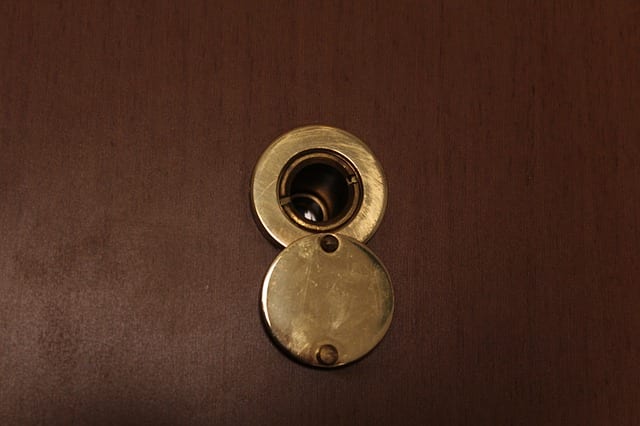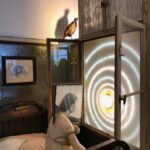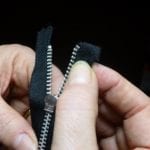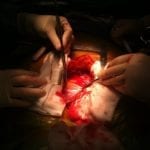Who is the Blinking Man? Where does he come from when he comes and where does he go to when he goes? Are the two places the same place? And does he serve some purpose that’s never been made clear, or that I’ve failed to understand? These are the questions I would ask if I were able to ask questions.
It wasn’t long ago when he first came to me, I think. I can’t recall the exact date. I have trouble now recalling anything with clarity. My mind is like a puzzle that once displayed a complete picture but has since been taken apart, the pieces jumbled, some of them placed upside down. Certain instances remain more or less intact in my recollection, but many more are lost. Sections of the past invisible, sections of myself unknowable. And perhaps that’s for the best.
For what it’s worth, I do seem to remember the beginning. It began with a knock on my door. Three knocks, to be exact. It was night, and I was getting ready to go to bed. I was anxious even before opening the door on account of the strange hour but also because I wasn’t generally accustomed to company. No one but myself had ever been inside my apartment while I lived there, and so I decided not to answer the door. But then there was another three knocks. And, after a pause, three more. Looking through the spyhole of my door I saw a face I would soon become all too familiar with, its strangeness amplified by the fisheye lens.
I opened the door and met the Blinking Man, although to say we met might imply introductions took place, which, of course, they didn’t. I stared at him for a moment, unable to help myself. He must have been almost seven feet tall, most of his height coming from his stiltlike legs, which held up an ordinary-sized torso. His arms were disproportionate too, hanging slack almost down to his knees. His dress was formal, but seemed absurd in some way, like he was in costume as the presenter from a traveling carnival, or an usher from an old-time cinema—black double-breasted jacket with red trim and big gold buttons lining each side; long black dress pants loosely covered his thin legs, and a small circular cap rested atop pitch black, slicked-back hair.
And then his face. It was the face of an older man approaching senility, so gaunt it was almost cadaverous. Large watery eyes gawked from deep sockets that looked bruised. He was clean shaven with poking cheekbones and chin, as though his skin was wrapped tightly over a skull that was too big. His smile was the cold, snide grin of a tickettaker, and it exposed bad teeth. His eyes never broke contact with mine, and they blinked at an even pace. Otherwise he was still as a statue.
“Hello there,” I said at last. “Can I help you?”
The Blinking Man stared into my eyes, blinking. There was something within his smile that unsettled me, like he was trying to appear friendly but instead looked menacing, the kind of smile that would make a child burst into tears. He didn’t respond.
“Well, are you certain you’ve got the right address?” I asked. “I mean, it’s just that I wasn’t expecting a visitor. I didn’t order anything if that’s what you’re here for.”
I couldn’t bear to maintain eye contact, but he never gazed elsewhere. And still, intolerably, he didn’t speak. I waited there a moment, each of us on either side of the doorway. I was waiting for him to say something, to explain himself. But all that ensued was a terrible silence.
“Well, it was nice to—” I began, already beginning to close the door. “It was nice to, um.” I shut the door and leaned against it. I knew he was still standing there, right there behind me, a mere piece of wood between us. I quietly, carefully, locked the door and went into the bathroom to continue getting ready for bed. Before retiring, I looked back through the spyhole and was relieved to see no one on the other side. I unlocked the door, opened it, and peered into the hallway of my apartment building. It was empty. I closed the door and went to bed.
The foregoing is a highly typical example of an encounter with the Blinking Man. Instances like it repeated themselves sporadically over the following months, although I have trouble remembering many other specific episodes. This is likely as much to do with the fact that each visit was more or less identical as it is the result of my failing memory. Always the same three knocks would announce his arrival, and, once I opened the door to him, he never had anything to say, if he was able to say anything at all. Nor did he ever make any attempt to enter my home or lead me somewhere else. He only smiled, and stared, and blinked.
After the Blinking Man’s initial visits, I confronted my landlord, who also lived in the building. I asked him if a new tenant had recently moved in. A key was required to open the front door of the building, and so I thought the Blinking Man might now be living here or had acquired a key in some other way. My landlord said no, no new tenants had moved in for some time, and why did I ask. I didn’t know what to say exactly, not wanting to sound paranoid or absurd. My landlord sucked on his cigarette and looked at me like he usually did, as though I were losing it, or had already lost it.
Meanwhile, the Blinking Man continued to visit me.
If I tried to ignore the knocking on my door, he would wait a moment, then knock again, and continue doing so until I relented and opened the door. If I opened the door and immediately slammed it shut again without looking at him, he would commence knocking. But if I opened it, acknowledged him in some way, said hello or simply met his eyes, and then closed the door, he would be gone the next time I looked.
Sometimes after closing the door on the Blinking Man, I would immediately open it again to try to see him leave. He would either still be standing there, exactly as before, or he would be gone. I never seemed to be able to witness him walking down the length of the hallway and exiting the building. If I looked through the spyhole just after closing the door I would see him still standing there, but if afterwards I quickly opened the door again, he’d have vanished. The implications of this horrified me, and I subsequently wished I had not conducted this kind of experiment.
I also recall instances of physical interaction. It occurred to me that when I opened the door to the Blinking Man, I was effectively trapped inside my apartment, since his large frame took up the entire doorway. All I had to do to get him to go away, though, was shut my door, wait a moment, and then open it again. Still, at some point, and I cannot say why, I tried to push past him, but couldn’t. His body felt harder than stone, and didn’t move whatsoever. I backed up and gave him another shove. His eyes were glued to my own, as always, his smile unwavering, but his body didn’t move even slightly. He was planted to the floor, an immovable monument. I grabbed him by the lapels of his jacket and tried to shake him. Still he wouldn’t budge, and it seemed as though his clothes were stuck to his body, or a part of his body. Appalled, I slammed the door to make an end of it.
At some point, I decided I needed to move out of my apartment, although I was loath to do it. It was an ordinary place, but it suited my needs, and I had lived there my entire adult life. But my mind felt on the verge of collapse; I lived in constant, dreaded expectation of the Blinking Man’s next visit.
And so I found rooms on the other side of town, much like my old rooms, and lived undisturbed for some period of time. I still found I could not talk to anyone about my strange troubles. There was no one who I trusted, no one I knew who would listen to my tale as anything but the deliriums of a solitary lunatic. After all, I carried no actual, tangible evidence that the Blinking Man existed outside of my own imagination, and I admit that after settling in my new abode and being without incident for a time, I allowed my own mind to seek comfort in the possibility that I had somehow invented my own torment.
But my respite was a momentary denial. For even in the privacy of my new home, I never felt entirely alone, never felt wholly alienated from a certain presence. I couldn’t rid myself of the impression that I was under constant surveillance by something unseen, as if the very walls of my home held invisible eyes belonging to something I could not comprehend. And again I lived in unbearable expectancy.
What a curse that each iteration of a recurring nightmare should seem new to the dreamer. I often woke in the night, wondering if the three knocks ringing in my ears were real or echoes from a dream. And as I would do so, I would sense that I was the subject of a motionless observer who was standing silently in a corner of my room or at the foot of my bed. Sometimes when I sat up, half my mind still asleep, I would see him for an instant, his pale face seeming to levitate in the darkness, his imbecilic grin spread across it like a deep wound. But if I tried to adjust my eyes to the dark and look more carefully, I would see nothing where I thought I’d seen him, or if I quickly struck my bedside lamp, he would be gone. I would be alone, sweating and restless, unable to convince myself that I was really alone.
Although I had never been one to immerse myself in public without reason, I now tried to spend as little time at home as possible. Even though no real incidents had yet occurred since I moved, I felt crippled by anticipation whenever I was by myself. And so I spent my days wandering aimlessly, through town or by the seaside, wondering if I should move somewhere else entirely, somewhere far away.
I returned from such an excursion late one afternoon and found that my key would not work in the lock of my door. I stood there in the hallway of my apartment building, confused, remembering that I had locked the door with the same key earlier that day. Thinking that the lock must somehow have gotten jammed, I was about to go see if my landlord was in when I heard something that made my soul shudder: three knocks came from the other side of the door, from inside my apartment. The sound was paralyzing. I wanted to run but couldn’t move. My door began to open, and standing there on the other side, in my own home, was the Blinking Man.
But he did not wear his usual expression. On his face was a look of utter horror, as though he were witnessing something truly terrible, or noticing at the last moment the oncoming of his own death. His head was tilted back and his eyes were wide with shock, and blinking madly. His mouth was peeled down in a frightened contortion.
As I stood mutely staring, his right arm slowly elongated toward me, as if manipulated by an invisible string. At first I thought he reached out to grab me, but then realized he aimed to shake my hand. Hypnotized by the strangeness of the moment, I lifted my own hand and placed it into his. His long fingers were like cold clasping wires. And as he gripped my hand too tightly, his eyes bored into my own, and I was transfixed, watching as his head bent forward and his face transformed into its typical countenance. His mouth slowly stretched upwards and his eyes, blinking, looked inside me and read my naked fear.
Then he began to disappear. It was not instantaneous, but tortuously gradual, so that for a moment I wasn’t sure if he was fading into nothing or if I was fainting from shock. But sure enough, he went, all the while gripping my hand and staring into me, his eyes seeming to remain after the rest of him was finally gone, lingering in my retinas like twin flashes from a camera.
Suddenly I was alone in the hallway of my building, standing before my open door, hand held out, holding nothing. In the next moment I was on the ground, sobbing or laughing hysterically, for as the Blinking Man disappeared, so too did a part of myself. It was in that moment that my mind shattered like glass under a weight, the pieces scattered. And as I wept and wiped my wet face, I noticed that the hand that shook the Blinking Man’s was no longer my hand. The fingers were too long and too thin, the bony knuckles wanting to poke through the wrinkled flesh.
Aspects unrelated to the Blinking Man deteriorate from memory so that my existence seems defined by his visits, his presence. He is the only portion of the puzzle that still forms a picture. I have various documents in my home bearing a name I assume was once mine, but I cannot remember a mother who gave it to me. My earliest distinct memory is of a sound. The sound of three knocks on an apartment door.






























